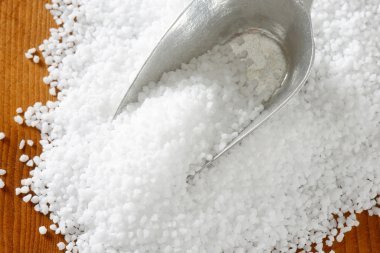Customer Support: 604793
Coarse Salt
Coarse salt, also known as kosher salt or rock salt, refers to a type of salt that has larger crystal sizes compared to regular table salt. It is commonly used in culinary applications and has a distinct texture and flavor. Here are some key points about coarse salt:
1. Texture and Crystal Size: Coarse salt has larger crystals, typically ranging from 1 to 3 millimeters in size. These larger crystals give it a unique texture and appearance compared to finer salts.
2. Culinary Use: Coarse salt is often used in cooking and food preparation. Its larger crystals make it ideal for applications where texture is desired or when it needs to be sprinkled or crushed. It is commonly used as a finishing salt, where it is sprinkled on food just before serving to add a crunchy texture and enhance the flavor. Coarse salt is also used for brining, marinating, and seasoning meats, as well as for rimming cocktail glasses.
Coarse salt, also known as kosher salt or rock salt, refers to a type of salt that has larger crystal sizes compared to regular table salt. It is commonly used in culinary applications and has a distinct texture and flavor. Here are some key points about coarse salt:
1. Texture and Crystal Size: Coarse salt has larger crystals, typically ranging from 1 to 3 millimeters in size. These larger crystals give it a unique texture and appearance compared to finer salts.
2. Culinary Use: Coarse salt is often used in cooking and food preparation. Its larger crystals make it ideal for applications where texture is desired or when it needs to be sprinkled or crushed. It is commonly used as a finishing salt, where it is sprinkled on food just before serving to add a crunchy texture and enhance the flavor. Coarse salt is also used for brining, marinating, and seasoning meats, as well as for rimming cocktail glasses.
3. Kosher Salt: Coarse salt is sometimes referred to as kosher salt because it is commonly used in the koshering process of preparing certain foods according to Jewish dietary laws. However, not all coarse salts are kosher salts, as the term “kosher salt” can also refer to a specific type of coarse salt that does not contain additives such as iodine.
4. Dissolution Rate: Due to its larger crystal size, coarse salt takes longer to dissolve compared to fine table salt. This characteristic can be advantageous in some recipes where a slower release of saltiness is desired.
5. Availability: Coarse salt is readily available in most grocery stores and supermarkets. It is commonly sold in boxes, canisters, or bags, and it is often labeled as “coarse salt,” “kosher salt,” or “rock salt.”
6. Alternative Uses: Coarse salt has applications beyond culinary use. It is often used for cleaning and scrubbing purposes, such as removing stains or grime from pots and pans. Coarse salt can also be used in homemade bath salts or as an ingredient in exfoliating scrubs.
It’s important to note that when using coarse salt in recipes, its larger crystal size means that a smaller volume of salt is needed compared to fine table salt. It’s always recommended to adjust the amount of salt used based on the specific type and grain size of salt being used.










